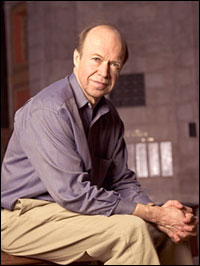

It was a sweltering June 23 in Washington, D.C., when climatologist James Hansen, head of NASA’s Goddard Institute for Space Studies, appeared before the Senate Energy and Natural Resources Committee to testify about his certainty that the record high temperatures were the result of human activity.
That was 20 years ago.
“The earth is warmer in 1988 than at any time in the history of instrumental measurements,” Hansen told senators, sweating in the 98-degree heat that the air conditioning system failed to keep at bay. “The global warming now is large enough that we can ascribe with a high degree of confidence a cause and effect relationship to the greenhouse effect … Our computer climate simulations indicate that the greenhouse effect is already large enough to begin to effect the probability of extreme events such as summer heat waves.”
Today, on this anniversary of his first landmark testimony, Hansen once again appeared before Congress. The air conditioners were working in the House office building today, but Hansen’s message wasn’t a whole lot different as he talked to members of the House Select Committee for Energy Independence and Climate Change this June 23 two decades later: The planet is warming, and if we don’t act fast we’re going to pass the point of no return.
“The interesting thing is how little we’ve done,” Hansen told Grist after today’s event, though he said he believes the political impetus — and the need for action — is increasing. “I think that we’re going to see changes in the next several years that will bring it closer to the top of the agenda. Even though the science has become clearer, it’s still well down the list of public priorities.”
He also said he thought that change was underway back when he gave his first landmark testimony. At the time, his testimony made headlines, with The New York Times declaring the next day that “Global Warming Has Begun.” But you wouldn’t know it, seeing as Congress has failed to take any action to curb emissions over the past 20 years.
“It looked like we were getting started really very quickly with the [U.N.] Framework Convention by 1992,” he continued. “If the U.S. had decided to take part, then the situation in China and India would be different now because there was a clean development mechanism which would have helped them with greener technologies. So it’s disappointing how little has been done — and we’re running out of time.”
Today, Hansen came armed with several proposals about what he thinks needs to be done. His first point, which he’s argued before, was that he is certain that the concentration of CO2 in the atmosphere is already beyond the safe level.
“I am more than 99.9 percent certain that the safe level of carbon is 350 ppm,” he said during today’s event, noting that we were at that level in 1982. Today we’ve hit 385 ppm. “If we leave it there for 10 years, we will be in danger,” Hansen said, and noted several tipping points that we’re already approaching.
His second major request was for an immediate moratorium on coal-fired power plants unless they are outfitted with carbon capture and storage technology. He suggested that while the United States is not going to end its reliance on oil anytime soon, it can end its use of coal plants without emissions controls, and that would be a significant step toward addressing climate change. He also called for a carbon tax and 100 percent dividend, suggesting that that would be the most politically feasible method of pricing carbon.
“We have to go to renewable energy,” said Hansen. “To do that in a way which actually stimulates the economy is to have a simple carbon tax and then give all the money back on a per-capita basis.”
He also suggested that the chief executives of large fossil fuel companies be put on trial for “crimes against humanity and nature” if they don’t change their tactics of misinforming the public about climate change. It is their misinformation, he said, that has confused the public about the reality of climate change and stymied action to stop it.
“They have had an impact on the discussion of this problem,” said Hansen. “The science has become clear, and yet the public has not been made aware of that, and it is primarily because of the fossil fuel special interests.”
Select Committee Chair Ed Markey (D-Mass.) also spoke at today’s hearing, calling Hansen a “latter-day Paul Revere, warning of the dangers to our planet.” Markey celebrated the fact that after 20 years of inaction, there has actually been some movement this year in Congress on climate change legislation, and public support for action is strong.
“When Al Gore wins a Nobel Prize and an Oscar for a slide show essentially based on what Dr. Hansen has been saying for years, you know the debate is over,” said Markey.


